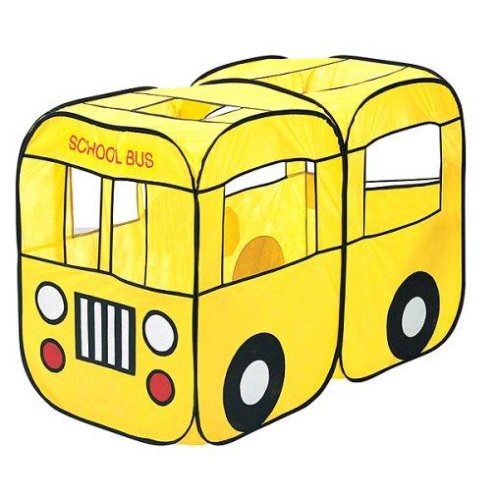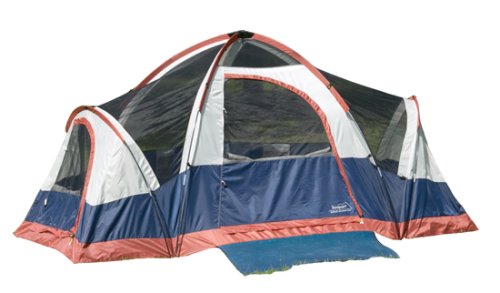School Bus
 Long before children are old enough to ride a yellow school bus, they long to be a passenger in this intriguing vehicle. Toddlers and preschoolers will especially appreciate this nylon, pop-up bus that measures a whopping 50 inches tall, 36 inches long, and 25 inches wide and is shaped just like a real bus. Once the freestanding bus is set up (it literally pops out of a sack and snaps into shape), children can set up chairs and walk about inside, dreaming up all kinds of imaginative school stories and bus-driver dramas. The yellow and black bus comes with a built-in crawl-through divider between front and back. Park a chair in the driver's seat and children can turn the built-in steering wheel. Folding takes patience and practice, but it will all fit--amazingly--into a small storage sack.--Gail Hudson
Long before children are old enough to ride a yellow school bus, they long to be a passenger in this intriguing vehicle. Toddlers and preschoolers will especially appreciate this nylon, pop-up bus that measures a whopping 50 inches tall, 36 inches long, and 25 inches wide and is shaped just like a real bus. Once the freestanding bus is set up (it literally pops out of a sack and snaps into shape), children can set up chairs and walk about inside, dreaming up all kinds of imaginative school stories and bus-driver dramas. The yellow and black bus comes with a built-in crawl-through divider between front and back. Park a chair in the driver's seat and children can turn the built-in steering wheel. Folding takes patience and practice, but it will all fit--amazingly--into a small storage sack.--Gail Hudson Customer Review: Tons of fun!
I had wanted to get my 17 month old daughter a play tent or something that she can go in and out of. I had found this school bus and thought I would try it out since it was so affordable. My daughter loves it! She loves to run in and out of the door flap and crawl through the hole in the back of the bus. She thinks it's hilarious when we stick our heads in through the windows when she is in there. This school bus is very light and can be knocked over and moved around but that is all part of the fun as my daughter even likes to move it around while she is inside of it. The best part is that it folds up easily in seconds to be put away and unfolds in seconds for play time.
Customer Review: Fun for everyone
This is one of the best inventions ever. A HUGE toy that my son loves and when he's done with it will EASILY fold up to fit under his bed. The whole family can get into it together - and we do. It has an inflatable steering wheel that clips onto the tent and sunroof windows where you can stick your head out. What more do you want for this price?
A canopy technically refers to any covering that serves as a shade (much like a tent) that is used either for protection against weather elements or for decorative purposes (as in canopy beds). Canopies can be made of any material such as transparent plastic, sturdy cloth, and even light fabrics, depending on what they are intended for.
People use canopies for a variety of reasons. Tradesmen, for example, use canopies to protect their merchandise against the harsh effects of the sun or the rain during exhibits. Canopies are also very handy for almost any outdoor event, such as weddings, funerals, birthday celebrations, and anniversaries.
Canopies have likewise been used in interior dcor since the early days. Palaces and mansions were the first to use canopies to add style and drama to their rooms. Now that there are interior design innovations and canopy beds have become easier to copy, even modern-day houses now use them. Canopy beds are fairly easy to make and bring instant elegance to an otherwise plain room.
Canopies are available in different types, sizes, and price ranges. Depending on your needs, you can either invest in one or just rent one. Measure your need against cost if you think you would be using it often (if you want to participate in outdoor exhibits or frequently have guests in your backyard, for example), then it might be wiser to invest in a canopy. Sturdy, tent-like canopies can go for as much as $1,500, but there are also cheaper versions that go for as low as $15 (dont expect these less expensive types to withstand heavy rains, though). Rental rates can be quite steep, too, but if you plan on using the canopy only once or twice a year, this is still your best option.
Canopy provides detailed information on Canopy, Canopy Beds, Canopy Tents, Canopy Rentals and more. Canopy is affiliated with Patio Enclosures.

